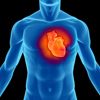MRI Aids in Identification of Scleroderma-Linked Heart Risk
Cardiac MRI may help provide diagnostic information about arrhythmogenic events in patients with scleroderma who are being considered as recipients of implantable cardioverter defibrillators.

Cardiac MRI may help provide diagnostic information about arrhythmogenic events in patients with scleroderma who are being considered as recipients of implantable cardioverter defibrillators (ICDs), according to a new study by Matthew Webber, PhD, and colleagues at the Royal Free Hospital in London.
Primary prevention of arrhythmogenic events in scleroderma patients by implanting ICDs has been attempted for some patients with reduced ejection fraction, but significant risks are associated with ICDs, including infection.
Among patients with significant arrhythmias observed with Holter monitoring, 73% also had positive gadolinium enhancement on cardiac MRI, compared with just 16% of patients without arrhythmias (P<0.05). MRI showed that 54% of patients with arrhythmias also had reduced ejection fraction, compared with only 4% of those without arrhythmia (P<0.05). This suggests that cardiac MRI may be of value in risk stratification of these patients when considering ICD implantation as primary prevention for sudden cardiac death.
Further study is needed to better define the appropriate patient population, Webber concluded.
Scleroderma heart disease contributes significantly to mortality: up to 15% to 20% of deaths directly related to scleroderma are cardiac in origin. Up to 80% of asymptomatic scleroderma patients are shown on autopsy to have cardiac involvement, and it is thought that manifestation of heart disease in these patients is often subclinical until it becomes very severe.
The researchers presented their findings at the annual meeting of the British Society for Rheumatology in Liverpool, England.